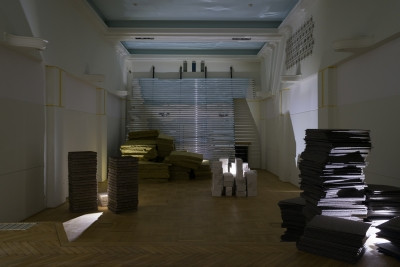Life under a Cherry Tree
about the exhibition
In 2016, the Brussels-Capital Region launched its “Programme Régional en Economie Circulaire”, enthusiastically embracing the concept of a "circular" economy. Like in many other European cities, a not so distant future is envisioned where material resources are utilised in "closed loops". It is a strategy that would allow infinite reusability and recyclability of materials without any loss of quality. The ambition is to create local employment while reducing environmental footprint.
The dominant manifestation of these ideas comes in abstract diagrams. An abundance of arrows is used to represent the yet to be developed business models, professions and social practices. In other words, the tangible social and material qualities of the circular economy and its rough patches remain to be seen.
In Life under a cherry tree, Rotor investigates the practicalities of the circular economy concept with particular regards to the building industry. The exhibition takes its title from a passage in Cradle to Cradle (2002), referring to a vision of an industry based on a system of “lifecycle development”. The aim is not only to document existing practices but also to imagine different circular economies that could come into existence.
about Rotor
Rotor is a cooperative design practice consisting of a group of architects, designers and other professionals interested in material flows in industry and construction, particularly in relation to resources, waste, use and reuse. Rotor disseminates creative strategies for salvage and waste reduction through research and design, and also produce exhibitions, books, economic models and policy proposals. Rotor’s approach consistently – and very often visually – emphasizes the effects of human planning, oversight, and extended use on the built environment. Material flows serve as a way to study how humans behave towards each other on a societal scale. In parallel with these exhibition projects, Rotor continued to realize various design projects, often interventions in existing architecture. This work has its equivalent in a growing series of deconstruction projects in which Rotor oversees the dismantling of building components in buildings slated for demolition, for reuse purposes. These dismantlings and the associated reselling activities are conducted under the heading of Rotor Deconstruction, a separate, spin-off entity created in 2014.
Rotor represented Belgium at the Architecture Biennale of Venice in 2010. Their exhibition, Usus Usures explored wear as a reaction to use in architecture and as potentially creative process. For the Prada Foundation, Milan, they curated ex limbo, a recollection of the material history of all Prada catwalks. The same year, 2011, they curated and designed the OMA/Progress show in the Barbican Art Gallery in London, an overview of the work of the Office for Metropolitan Architecture, while in 2013 they curated the Oslo Architecture Triennale titled Behind the Green Door, including a vast exhibition on the challenges facing ‘sustainable’ architecture today. In 2018, Rotor participated in Manifesta 12 Palermo with Monte Gallo offering new points of view on the relationship between man and landscape. Life under a cherry tree is the first solo exhibition of Rotor in Brussels, where the collective is based.
